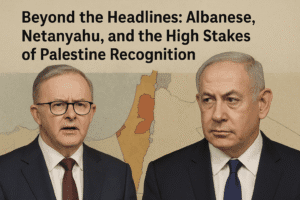Beyond the Headlines: Albanese, Netanyahu, and the High Stakes of Palestine Recognition
Australian Prime Minister Anthony Albanese has publicly accused Israeli leader Benjamin Netanyahu of being “in denial” about the devastating civilian consequences of Israel’s war in Gaza. This stark criticism follows Australia’s decision to formally recognize Palestine at the UN next month – a move strongly supported by France’s Emmanuel Macron but fiercely condemned by Israel. Netanyahu’s government views the recognition as rewarding Hamas, citing a leader’s boast that such moves are “fruits” of the October 7th attacks.
Meanwhile, Netanyahu faces widening international criticism, including from Italy’s Giorgia Meloni, over Israel’s intensified military push into Gaza City, which critics warn endangers remaining hostages and civilians. While Australia vows to maintain diplomatic ties despite the rift, the move deepens Netanyahu’s isolation over Gaza’s humanitarian crisis and the lack of a clear political solution. The situation underscores the painful divide between Israel’s security demands and global alarm over the war’s human cost.

Beyond the Headlines: Albanese, Netanyahu, and the High Stakes of Palestine Recognition
The diplomatic rift between Australia and Israel deepened this week as Prime Minister Anthony Albanese directly accused Israeli leader Benjamin Netanyahu of being “in denial” about the devastating human cost of the war in Gaza. This stark criticism emerges against the backdrop of Australia’s controversial decision to formally recognize Palestine as a state at the United Nations next month – a move hailed by France but condemned fiercely by Israel as a reward for Hamas.
A Collision Course Over Recognition: Albanese confirmed a tense phone call with Netanyahu last Thursday, revealing the Israeli Prime Minister reiterated his public stance dismissing the severe consequences for Gaza’s civilians. “If Israel continues to not heed our warnings, we’re not going to stop diplomatic relations,” Albanese stated on ABC Radio National. “That’s completely counterproductive.” This underscores Australia’s strategy: maintaining dialogue despite profound disagreement, reflecting a belief that engagement, however strained, remains essential.
International Momentum vs. Israeli Fury: Australia’s decision places it firmly within a growing international movement. French President Emmanuel Macron, who spearheaded renewed calls for recognition in late July, publicly welcomed Albanese’s announcement, linking it to similar steps by the UK, Canada, and Portugal. Macron framed it as crucial for rebuilding a “political pathway” to peace and security for all.
Israel’s response was scathing. Deputy Foreign Minister Sharren Haskel slammed the timing, highlighting the 50 remaining hostages held by Hamas and accusing Australia of rewarding “the monsters of October 7.” Israel pointed to inflammatory remarks by Hamas leader Ghazi Hamad, who boasted that international recognition efforts were “the fruits” of the October 2023 attacks. “Why are all the countries recognising a Palestinian state today? Before October 7, did any country dare…?” Hamad declared on Al Jazeera.
Netanyahu’s Gaza Strategy Under Fire: Beyond the recognition dispute, Netanyahu faced mounting international criticism over Israel’s military strategy. The decision to intensify operations and target Gaza City – the enclave’s largest population center – drew sharp rebukes. Italian Prime Minister Giorgia Meloni expressed “deep concern,” deeming the escalation “unjustifiable and unacceptable.” Opposition figures within Australia echoed these fears. Andrew Hastie, Shadow Home Affairs Minister, bluntly stated that advancing into Gaza City “absolutely” endangered the lives of the remaining hostages.
The Core Tensions and Unanswered Questions: This complex situation highlights several critical tensions:
- Humanitarian Catastrophe vs. Security Demands: Albanese’s “denial” accusation centers on the unbearable civilian toll – starvation, mass casualties, and collapsed healthcare. Israel maintains its actions are necessary to dismantle Hamas and secure hostage release.
- The Recognition Dilemma: Proponents (Australia, France, UK) argue recognition is essential to revive the moribund two-state solution, predicated on Palestine accepting Israel’s right to exist and excluding Hamas. Critics (Israel, Italy) argue it’s premature, rewards terrorism, and changes nothing on the ground without direct negotiations and Hamas’s defeat.
- Hamas’s Shadow: Israel’s vehement reaction is fueled by Hamad’s comments, reinforcing their view that recognition legitimizes Hamas’s brutal tactics. Australia and its allies insist recognition is aimed at empowering the Palestinian Authority and marginalizing Hamas in a future state structure.
- Domestic vs. International: Haskel’s claim that Australia’s move is “all about domestic politics” reflects Israeli skepticism. Conversely, Albanese frames it as a principled step towards long-term peace, supported by key allies.
The Path Forward: The diplomatic fallout is significant. While Australia and Israel maintain formal ties, trust is deeply eroded. Netanyahu faces increasing isolation from traditional partners alarmed by Gaza’s humanitarian crisis and the lack of a clear post-war plan. The planned UN recognition next month will be a major flashpoint, testing the resolve of the international coalition supporting it and the depth of Israel’s diplomatic backlash.
The tragedy unfolding in Gaza remains the grim backdrop. As the war intensifies around Gaza City, the warnings about civilian suffering and hostage safety grow more urgent. Albanese’s charge of “denial” speaks to a fundamental disconnect in how the consequences of this conflict are perceived internationally and within the Israeli government itself. The path to peace seems more elusive than ever, overshadowed by escalating military action, deep diplomatic fractures, and the immense human cost paid by innocent civilians on both sides. The world watches, hoping for a breakthrough that prioritizes humanity over continued devastation.
You must be logged in to post a comment.